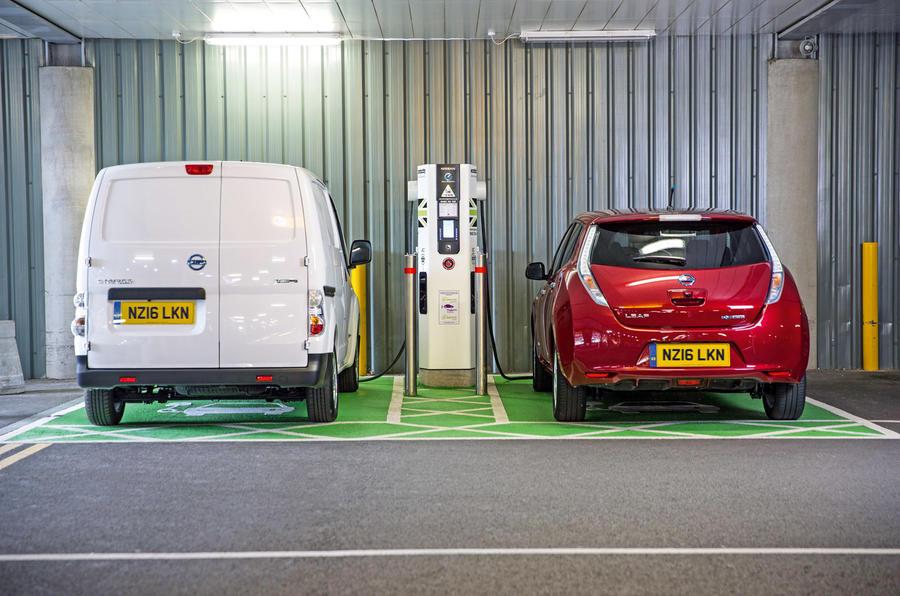The electric car revolution is poised to hit the UK this year, but not because of purchase grants, green-shaming or European Union regulations. Instead, the expected sales boom is set to be driven largely by a change to company car tax regulations.
After next week's upcoming changes were announced in July 2019, sales of EVs doubled in the second half of the year compared with the first half, according to figures from the Society of Motor Manufacturers and Traders (SMMT). Business lease firm Alphabet reported a 165% rise in orders for plug-in vehicles.
The UK’s company car market is big business. Up to the end of November last year, 53% of cars sold went to fleets, SMMT figures show. Company cars aren’t free; they're a heavily taxed perk and the government has since 2002 pegged the rate of duty to the car’s official CO2 emission figure. That move forced drivers out of thirsty petrol-engined cars and into more frugal diesels as companies sought to reduce the tax burden on their employees.
This year, however, the focus switches to plug-in cars. From 6 April 2020, people who choose electric cars will pay 0% company car tax: nothing at all.
“The fleet sector has a lot of pent-up demand, and this tax incentive could lead to a big surge in EVs,” said Gerry Keaney, chief executive of the British Vehicle Rental and Leasing Association (BVRLA).
Simultaneously, company car tax will, for the first time, be calculated using the CO2 figures generated by the new, tougher Worldwide Harmonised Light Vehicle Test (WLTP) regime. In short, the government is offering a huge, juicy carrot for drivers choosing electric and plug-in hybrid cars and an extra whack of the stick for staying with conventional diesels or petrols.
How all this is worked out will already be familiar to company car drivers. The tax, known as benefit-in-kind (BIK), is expressed as a percentage of the car’s list price. For example, a Vauxhall Astra 1.2 turbo petrol with CO2 measured at 99g/km currently falls into the 23% tax band. That figure is further modified by the employee’s salary tax band, so those who earn more pay more.
To give an idea of how generous the new tax rates are, the driver of a Nissan Leaf electric car previously would have payed between £871 and £1960 in company car tax, depending on their salary. From 6 April, the Leaf falls into a 0% tax band, meaning they’ll pay nothing. That generosity from the government lasts only a year, but the following tax year the Leaf bill rises to just £54-£122, then £109-£245 the year after that (company car taxes rise annually with the same inevitability as rail fares).






Join the debate
Add your comment
Price
The difference between a LEAF and a equivalent Diesel Focus with Auto box capable of hitting 60 in 8.5 is not that great now and fuel savings alone more than make up the difference. Want cheaper go with a Zoe
Shortage of power points and electricity rants is just sour grapes from luddites, Norway has no problem with charging points and 50% of their new cars have a plug attached. Running a BEV aisn't a problen for 50%+ of population NOW, and with tech improving another 30%+ will be covered in 5 years time. ICE cars will be around for some time so why all the anti BEV rants?
Effect of tax changes on EV uptake is overstated by Autocar
The reality is that EV sales are increasing anyway, because people are starting to realise that EVs are great fun to drive and much cheaper to run.The biggest brake on their uptake will be traditional manufacturers and the traditional motoring press dragging their feet. As usual, incumbent dinosaurs stand in the way of progress.Get a copy of the old doc 'Who killed the electric car?' for a case in point.
Or research how Chevron bought the patent to NiMH batteries and sued Panasonic to stop them supplying batteries large enough to power EVs in the 1990s, delaying the progress of EVs by 10 years.
I get the reasoning why they
I get the reasoning why they are doing this, to help get more in to zero emission at point of use vehicles. However, I don't see it making massive differences. Yes, quite a few more will be sold, but for the majority of company car drivers,they won't have a PHEV or EV on their company car lists. Mostly down to the extra costs to buying one over a standard car.
I would happily have a PHEV, but I need an estate car. We only go with VW*, which means it would be the GTE spec, at almost £37000 vs a decent spec diesel version for 10k less.
*Corolla hybrid is now on the list, which is what I be going for next